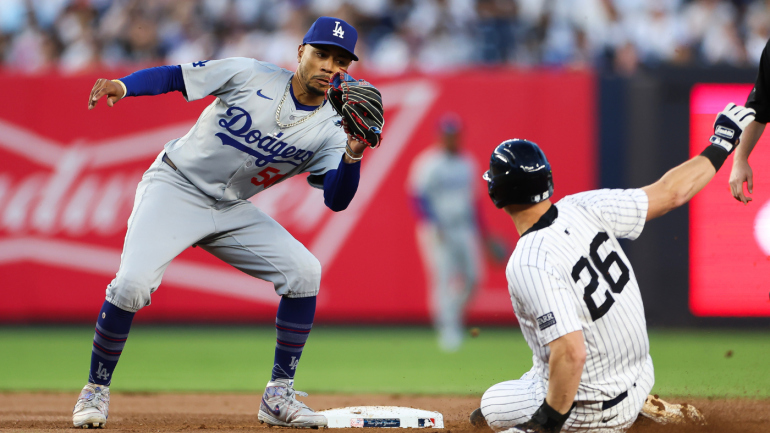
The Los Angeles Dodgers defeated the New York Mets on Sunday to win the National League pennant. The Dodgers will now have a few days to recover before kicking off the 2024 World Series against the New York Yankees on Friday, Oct. 25. (The Yankees punched their own ticket to the Fall Classic on Saturday, when they defeated the Cleveland Guardians to secure their first American League pennant since 2009.)
This will be the 12th time the Yankees and Dodgers franchises have squared off in a World Series, but it will represent the first meeting since 1981. The Yankees are 8-3 all-time in those series. The Dodgers, however, have had more practice as of late, with this serving as their fourth trip to the World Series since 2017.
CBS Sports will have plenty of preview material rolling out over the coming days. For now, here are a few bite-sized pieces of information that you need to know about this World Series matchup.
1. Dodgers have home-field advantage
It wasn't too long ago that Major League Baseball determined home-field advantage based on whichever league won the All-Star Game. Thankfully, that's been out of style since 2017. Now, that honor goes to whichever team has the higher regular season winning percentage. (Ties are broken based on head-to-head matchups.)
The Dodgers went 98-64 during the regular season; the Yankees 94-68. We needn't explain that the Dodgers had the better winning percentage. As such, the Dodgers will host Games 1 and 2, as well as 6 and 7 if either/both prove to be necessary. The Yankees, conversely, will host Games 3, 4, and 5 (again, if it ends up being necessary).
2. Old foes meet once again
As we noted in the introduction, this will represent the 12th time the Yankees and the Dodgers have met in a World Series. The Yankees are 8-3 in those series.
According to CBS Sports HQ's research staff, this is the most common playoff matchup in MLB history. It'll also serve as the first clash between these clubs on baseball's grandest stage since 1981. The Dodgers just so happened to win that Fall Classic.
Here are the years and results of the other Yankees-Dodgers World Series over the years -- keep in mind that the Dodgers were based in Brooklyn until the 1958 season.
- 1941: Yankees 4-1
- 1947: Yankees 4-3
- 1949: Yankees 4-1
- 1952: Yankees 4-3
- 1953: Yankees 4-2
- 1955: Dodgers 4-3
- 1956: Yankees 4-3
- 1963: Dodgers 4-0
- 1977: Yankees 4-2
- 1978: Yankees 4-2
- 1981: Dodgers 4-2
Those World Series have featured some of the game's biggest stars and moments (Don Larsen threw his perfect game against the Dodgers in 1956). This year certainly won't lack for star power, either, not with the likes of Shohei Ohtani and Aaron Judge -- the favorites to win their respective league's MVP Awards -- leading the charge.
3. Battle of top seeds
This isn't just a meeting of old rivals; this is also a meeting of teams with the best records in their respective leagues.
The last time that happened was in 2020, although it's fair to point out that season was truncated by the COVID-19 pandemic and therefore doesn't carry the same weight as this year's matchup.
The last time this happened after a 162-game season was in 2013, when the Boston Red Sox and St. Louis Cardinals each won 97 games. The Red Sox won that series in six.
4. Dodgers took season series
Thanks to the miracle of interleague play, the World Series won't be the first meeting between the Yankees and Dodgers this year.
These squads met back in June for a three-game set at Yankee Stadium. The Dodgers took two of the three games, claiming the series by a 17-10 margin. To be fair, that number is skewed by an 11-3 Dodgers victory in the middle game of the set.
5. Game 1 on Friday
Once again, there will be no baseball until Friday, Oct. 25. The Yankees and Dodgers will have ample time to rest up and align their rotations as they see fit. It's too early to know for sure what the pitching matchup will be once the World Series kicks off, but our best guess is that it'll feature Gerrit Cole and Yoshinobu Yamamoto.
![[object Object] Logo](https://sportshub.cbsistatic.com/i/2020/04/22/e9ceb731-8b3f-4c60-98fe-090ab66a2997/screen-shot-2020-04-22-at-11-04-56-am.png)


















